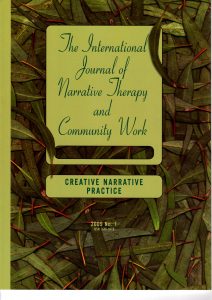 Dear Reader,
Dear Reader,
Compiling the first journal issue of each year, and sending it to the printer, is a significant ritual. It always signals new ideas and directions. It links us with the authors of the papers, and also all the subscribers. As we write these editorials, we think of you, the reader, and whatever context you may work within.
Last year was momentous for Dulwich Centre with the passing of Michael White and Flora Tuhaka. Now, each time that we have the opportunity to publish new, creative directions of narrative practice, we find ourselves looking both backwards and forwards. We find ourselves recalling the origins of narrative therapy and the early enthusiasm of Michael, David Epston and others. We find ourselves remembering Flora Tuhaka who, along with the others from the Just Therapy Team in New Zealand, brought such challenge and innovation to the field in relation to issues of culture. At the same time, we are celebrating the creativity which is currently occurring within the field. This journal issue vibrantly showcases this.
It begins with a paper by a young feminist practitioner, Holly Loveday, who is using narrative practices to transform a women’s refuge to become a place of celebration of women’s stories. It then includes a piece from Peter Ord and Emma about their use of a cartoon as a way to gain influence over a problem.
The second section of this journal issue focuses on re-membering practices with elders. We are delighted to be able to include papers by Bobbi Rood and Mark Trudinger on these issues. There have been relatively few published papers about the use of narrative therapy with older people. These two papers seek to redress this.
The third section ‘Pastoral narrative practice’, includes two descriptions of narrative therapy about people’s relationship to Christianity. Josie McSkimming and Kim Barker consider the politics of religion, fundamentalism and spirituality within their therapeutic practice.
Finally, our attention turns to a paper from Diane Clare in which she reflects with honesty and thoughtfulness on her work with Jay, a woman who engaged in acts of extreme self-harm, and who took her own life.
This is a collection of thoughtful and at times profound papers from practitioners from England, South Africa, USA and Australia. We would like to thank all the authors for their contributions. As always, we will welcome your feedback.
We hope 2009 is treating you kindly so far.
Warm regards,
Cheryl White

 Dear Reader,
Dear Reader,